Around $2 trillion needed annually to triple global renewables by the year 2030: Report
Asia is the only region on course to tripling global renewable energy capacity
image for illustrative purpose

India will witness over 83% increase in investments in renewable energy projects, which is likely to be around $16.5 billion this year as the country focuses on energy transition to reduce carbon emissions, according to power ministry estimates.
This is in line with the ambitious target of having 500 GW of renewable energy by 2030, and its resolve to reduce overall power generation capacity from fossil fuels to less than 50%. India has committed to achieve the net zero emission target by 2070.
An investment of $ 12 trillion till 2030 is needed to deliver the goal of tripling renewables, as agreed at the UN climate conference in Dubai in December.
The report by global think-tank Climate Analytics said Asia is the only region broadly on course to meet the goal of tripling global renewable energy capacity - driven mostly by policies in China and India.
The region makes the biggest overall contribution, providing around half (47 per cent) of the 8.1 Terawatt of renewable capacity additions needed globally by 2030. However, the significant coal and gas pipelines in these countries risk stranded assets or slowing the transition. As renewables are set to grow strongly in the region, new fossil fuel plants are not needed and should be avoided, it said.
The growth of renewable energy in China and India compensates for laggards such as South Korea, where it is set to grow at half the rate of the region as a whole.
The report finds that an investment of $ eight trillion is needed for new renewables and $ four trillion for grid and storage infrastructure for tripling global renewable energy capacity to 11 Terawatt or 11,000 Gigawatt.
According to International Energy Agency (IEA), tripling the global renewable energy capacity and doubling the energy efficiency rate by 2030 are critical to limiting the average global temperature rise to 1.5 degrees Celsius.
A majority of the global capacity gap needed to be closed by 2030 is found in OECD (Organisation for Economic Co-operation and Development) countries that are currently lagging behind the 1.5-degree-Celsius compatible benchmark by around 1 to 1.4 Terawatt. No country in the OECD is on track to triple renewable energy capacity relative to 2022 levels, the report said.
Renewables capacity in sub-Saharan Africa needs to scale rapidly by a factor of seven (double the global average) due to historic underinvestment and energy access needs, it said.
"It sounds like $ two trillion a year is a cost but it's really a choice. We are set to invest over $ six trillion in fossil fuels over this decade - more than enough to close the tripling investment gap. It is the safest, best-value option – renewables," it points out. Countries in the region claiming to be climate leaders need to walk the talk, not just by ramping up renewables at home but by coming through for other regions that need finance to contribute to the tripling goal.
The report finds renewables need to continue growing strongly beyond the end of the decade - scaling up five times by 2035 relative to 2022 - to limit warming to 1.5 degrees Celsius.
In 2015, countries agreed in Paris to limit the average temperature rise to well below two degrees Celsius, and preferably to 1.5 degrees Celsius, compared to pre-industrial levels (1850-1900), to avoid worsening climate impacts.
Long-term data shows earth's global surface temperature has risen by around 1.15 degrees Celsius as compared to pre-industrial levels (1850-1900). The business-as-usual scenario will take the world to a temperature rise of around three degrees Celsius by the end of the century, scientists have warned.
To limit global warming to 1.5 degrees Celsius, countries together need to cut down the emissions of planet-warming greenhouse gases like carbon dioxide and methane by 43 per cent by 2030.
At the 28th UN climate conference on climate change in Dubai, nearly 200 countries, for the first time, agreed to transition away from fossil fuels in a "just, orderly, and equitable manner" to avert the worst impacts of climate change.
Climate finance will be the main focus of this year's UN climate conference in Baku's capital Azerbaijan, where nations have to set a new post-2025 target for raising funds to help developing nations cut emissions and handle the impact of climate change.

